外研版Module 3 Body Language and Non-Verbal Communication listening and Vocabulary课件(共40张PPT)
文档属性
| 名称 | 外研版Module 3 Body Language and Non-Verbal Communication listening and Vocabulary课件(共40张PPT) |
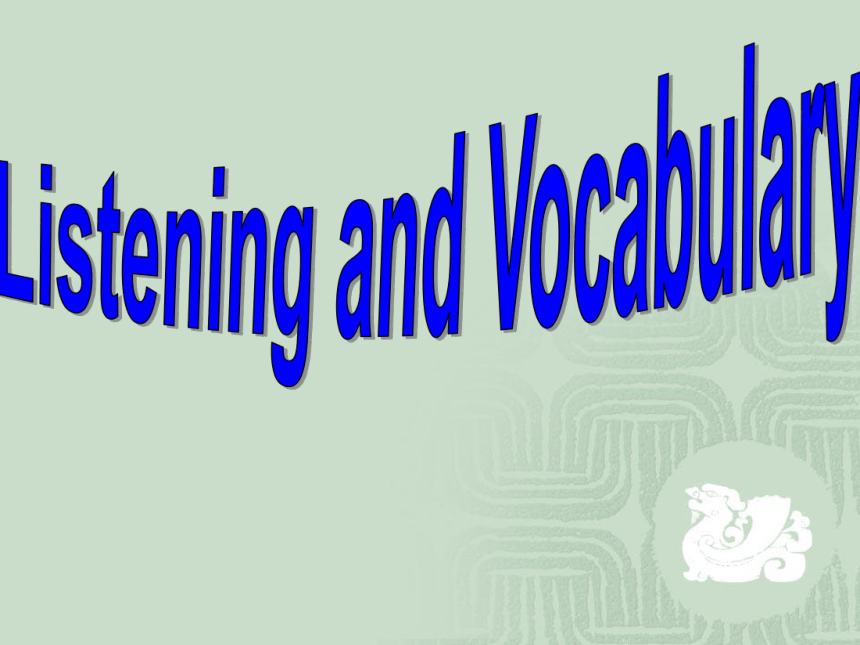
|
|
| 格式 | zip | ||
| 文件大小 | 947.7KB | ||
| 资源类型 | 教案 | ||
| 版本资源 | 外研版 | ||
| 科目 | 英语 | ||
| 更新时间 | 2018-12-03 00:00:00 | ||
图片预览

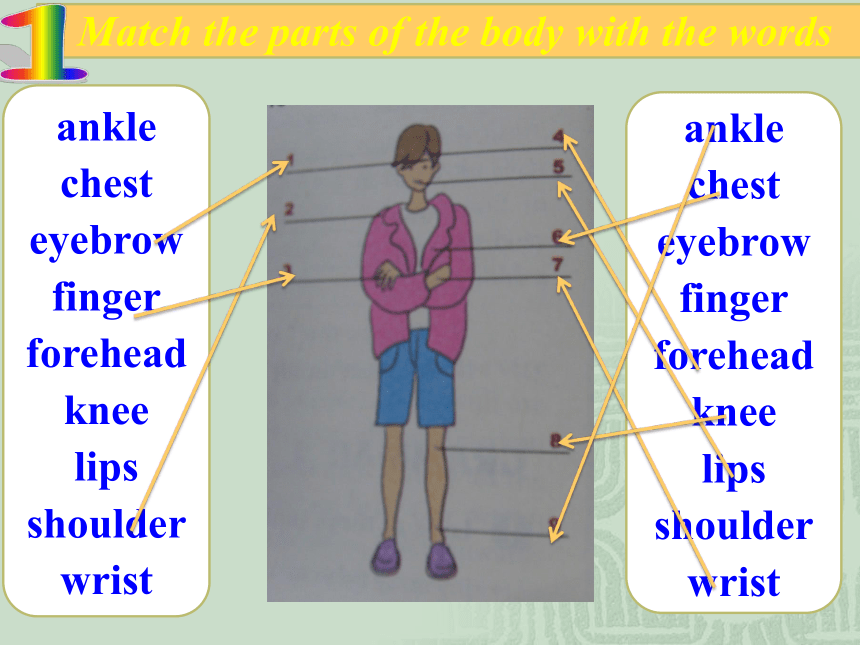


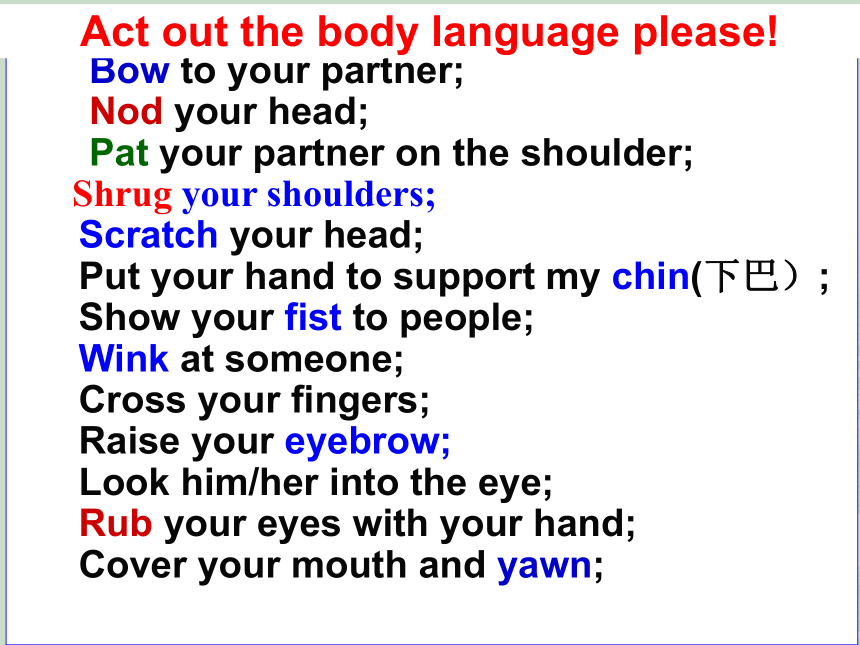
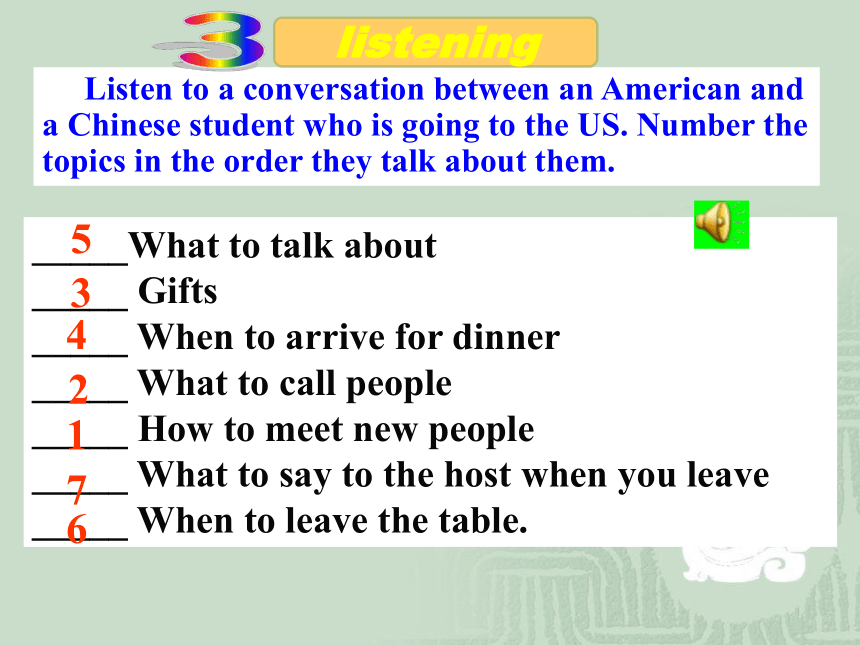

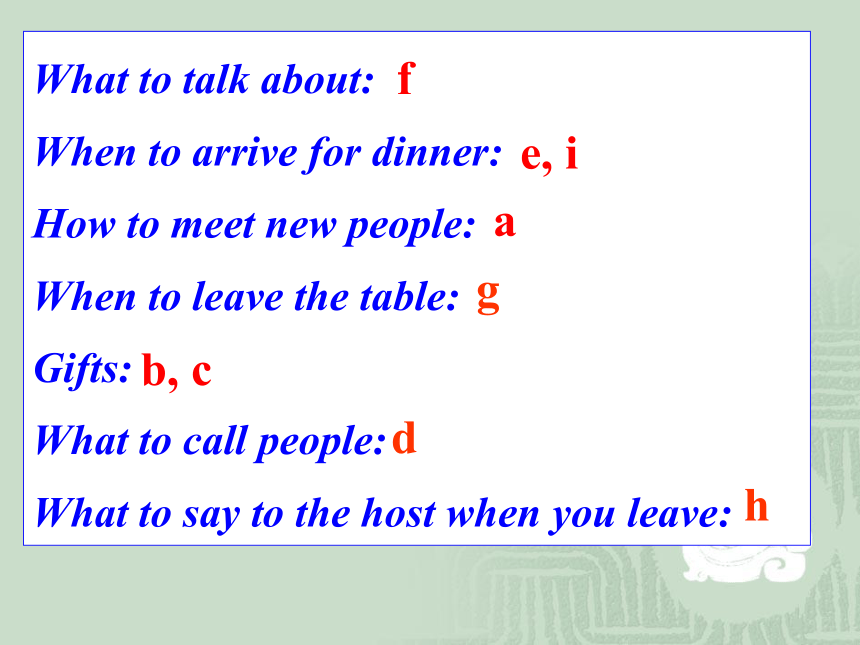
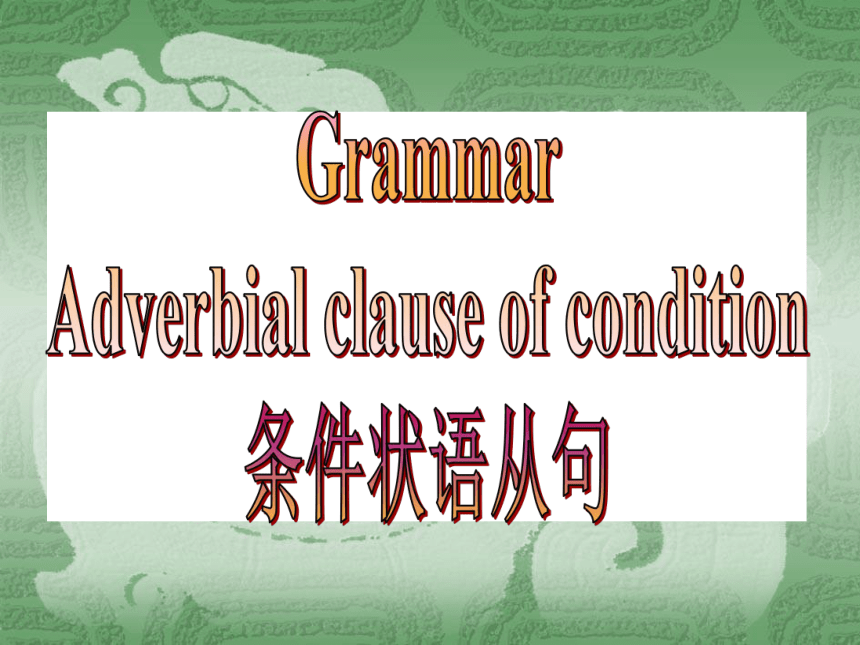
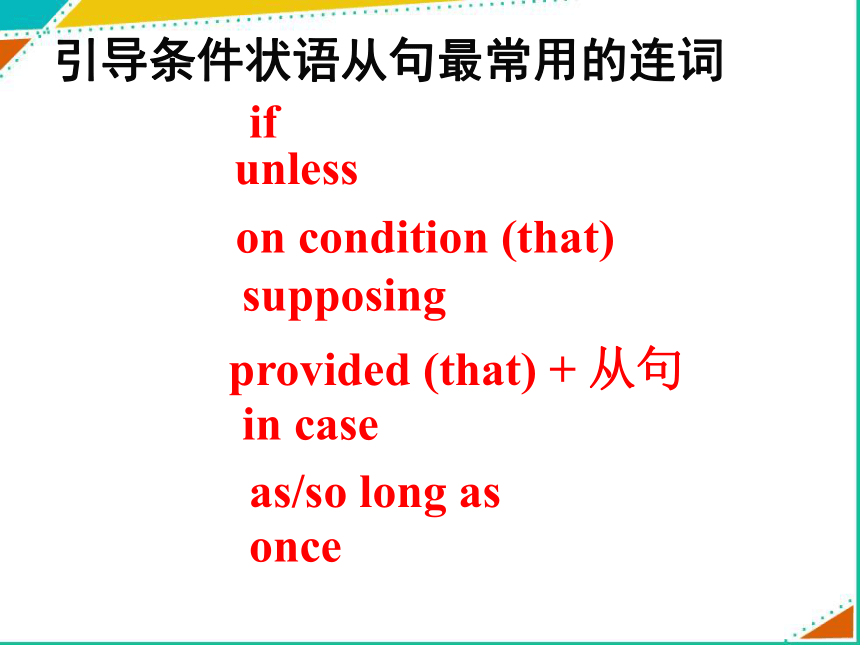
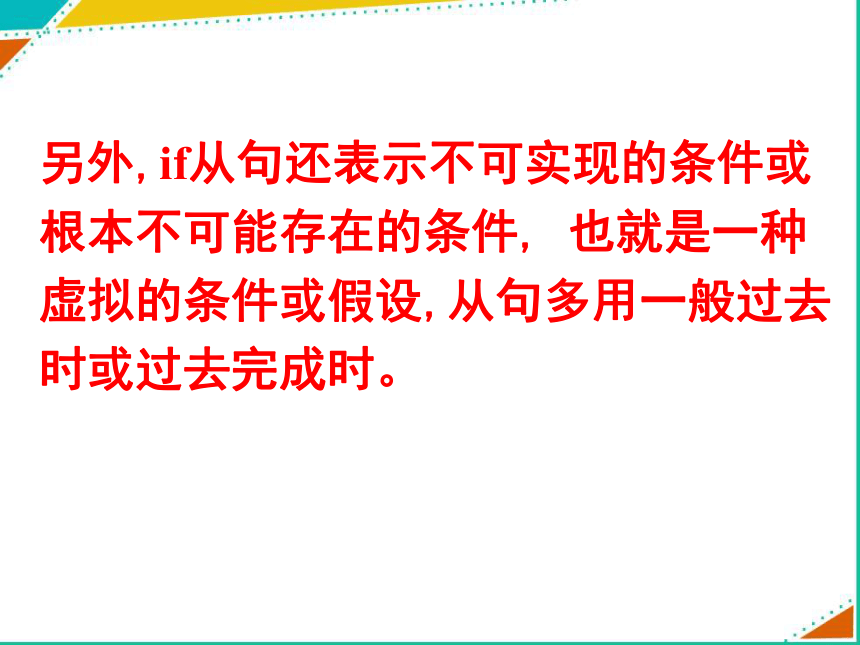
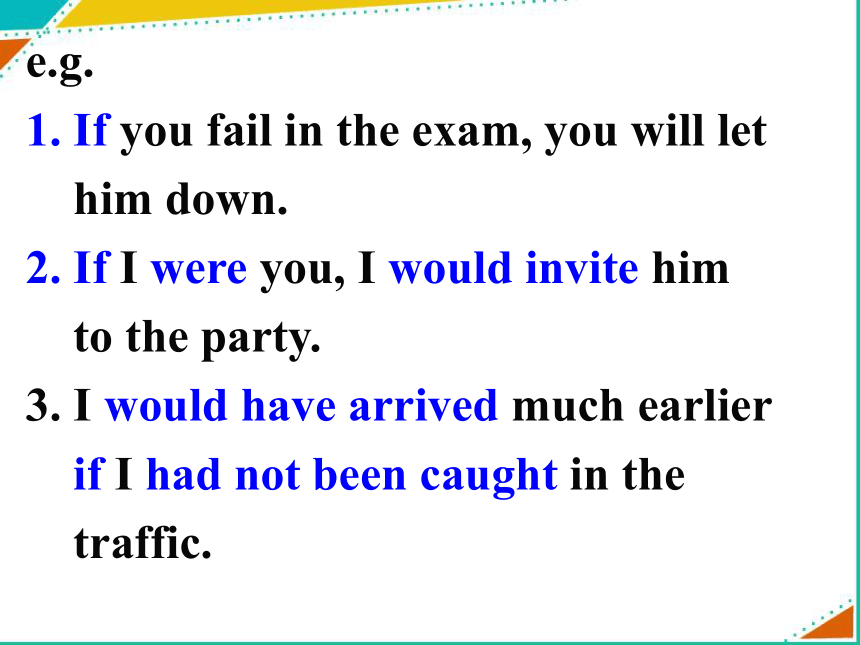
文档简介
课件40张PPT。Listening and Vocabularyankle
chest
eyebrow
finger
forehead
knee
lips
shoulder
wristankle
chest
eyebrow
finger
forehead
knee
lips
shoulder
wrist Match the parts of the body with the words 1 1.You use your lips to ____someone.
2.?If you _____ at someone you look
at them for a long time.
3.?If you ____ your hand you lift it up.
4.??You _____ by moving your head
up and down. kiss stareraise nod Look at the list of verbs.
Complete the sentences. 2 5.?When you bend your upper body
forwards you _____.
6.?You have to _____your knees to
sit down.
7.?If you’re hot you can _____ the
sweat from your forehead
8.?At the end of a concert or a play it
is usual to _____. bow bend wipe clap Bow to your partner;
Nod your head;
Pat your partner on the shoulder;
Shrug your shoulders;
Scratch your head;
Put your hand to support my chin(下巴);
Show your fist to people;
Wink at someone;
Cross your fingers;
Raise your eyebrow;
Look him/her into the eye;
Rub your eyes with your hand;
Cover your mouth and yawn;
Act out the body language please! Listen to a conversation between an American and a Chinese student who is going to the US. Number the topics in the order they talk about them. _____What to talk about
_____ Gifts
_____ When to arrive for dinner
_____ What to call people
_____ How to meet new people
_____ What to say to the host when you leave
_____ When to leave the table. 1234567listening3Match the following pieces of advice with the topics in activity 3. a.?You should shake hands when you meet new
people. ____
b.?You should bring some flowers or a bottle of
wine. ______
c.?You should open gifts immediately. ______
d.?You shouldn’t use family names. _______
e. You shouldn’t arrive too late. _______
f. You shouldn’t talk about politics or religion.
g. You mustn’t leave as soon as you finish the
meal._______
h.?You must thank your host for a wonderful
evening.______
i.??You mustn’t arrive early. _________4What to talk about:
When to arrive for dinner:
How to meet new people:
When to leave the table:
Gifts:
What to call people:
What to say to the host when you leave: f e, i a gb, c dhGrammar
Adverbial clause of condition
条件状语从句
引导条件状语从句最常用的连词 if unless on condition (that) supposing provided (that) + 从句 in case as/so long as once
另外,if从句还表示不可实现的条件或根本不可能存在的条件, 也就是一种虚拟的条件或假设,从句多用一般过去时或过去完成时。e.g.
1. If you fail in the exam, you will let
him down.
2. If I were you, I would invite him
to the party.
3. I would have arrived much earlier
if I had not been caught in the
traffic. 1.You will fail to arrive there in time
unless you start earlier.
2. Unless it rains, the game will be
played. 1. I can tell you the truth on condition that you promise to keep a secret.
2. You can go swimming on condition
(that) you don’t go too far from the
river bank.
1. Supposing it rains, shall we continue
the sports meeting?
2. Supposing something should go
wrong, what would you do then?
supposing, provided (that) 引导的条件从句表示一种_______。假设条件
1. He will sign the contract provided
we offer more favorable terms.
2. He won’t be against us in the
meeting provided that we ask for
his advice in advance. 1. In case it rains, do not expect me.
2. As long as you promise to come,
I’ll wait for you until you come.
但有些句子, 虽没有含条件关系的连词,却也隐含着条件关系, 这些句子常用一些词, 如but for, without等引出一个介词结构来表示条件, 条件常常是虚拟的,或与事实相反的假设。but for 若非, 要不是e.g.
1. But for the rain, we should have a
pleasant journey.
2. But for your help, we should not
have finished in time.
1.?If you ____ a cake, your host ______ very pleased. (take, be)
2.?Unless the weather ____ better, I _______ at home. (get, stay)
3.?He _______ home early if he __________ well. (go, not feel)take will be gets will stay will godoesn’t feelComplete the sentences with the
correct form of the verbs in brackets.P26
24.?What _____ I ___ if they ____ about politics? (do, talk)
5.?If you _____ your hand, the taxi _________. (raise, stop)
6. I __________ anything unless he ____ me. (not say, ask)raise will stop will not say asksshalldotalk1. —Are you thinking about going to New York for the holiday? —No. But if I ________the time, I
would definitely go. A. have???? B. had??
?C. have had????? D. would have BChoose the best answers.2. If you ____ this experiment, you will understand the theory better. A. will be doing??????? B. have done?????
C. will have done???? ?D. would do B3. The volleyball match will be put
off if it ____. A. will rain?????????? B. rains??????
C. rained????????????? D. is raining B4 . — Shall Brown come and play
computer games? — No, _____ he has finished his
homework. A. when???B. if???C. unless???D. onceCAdverbial clause of concession
让步状语从句 1. though, although表示“虽然, 纵然”之意。在一般情况下可以互换使用。
在口语中, though 较常使用, although比though正式, 二者都可与yet, still或nevertheless连用, 但不能与but连用。 让步状语从句的引导词:e.g. 1.Though/Although he was worn out, (still) he kept on working.
2. Though/Although he is very old, (yet) he is quite strong.
2. Object as you may, I’ll go. = Though
/ Although you may object, I’ll go.
Hard as/ though he works, he makes
little progress.= Though he works
hard, he makes little progress.
【归纳】
as引导的让步状语从句必须以___________的形式出现, 被倒装的部分可以是表语、状语或动词原形, though间或也用于这样的结构中, 但although不可以这样用。 部分倒装even if, even though 表示“即使…”, “纵使…”之意。这两个复合连词的意思基本相同 。
We’ll make a trip even if/though the
weather is bad.
Even if he is poor, she loves him.
whether ... or ...表示“不论是否…”, “不管是…还是…”之意。
由这一个复合连词引导的让步状语从句旨在说明正反两个方面的可能性都不会影响主句的意向或结果。e.g. You’ll have to attend the ceremony
whether you’re free or busy.
不管你忙不忙, 都要参加这个典礼。
Whether you believe it or not, it’s
true.无论你是否相信, 这都是真的。“no matter + 疑问词”或“疑问词-ever”的含义为“…都…; 不管…都…”, 它们引导的让步状语从句可以互换。
e.g. No matter what happened, he
would not mind.
= Whatever happened, he would
not mind.
无论发生了什么, 他都不会介意的。 No matter who you are, you must keep the law.
=Whoever you are, you must keep the law.
但“no matter + 疑问词”结构只能引导让步状语从句, 而“疑问词-ever”还可以引导名词性从句。
e.g. Whatever (= No matter what) you
say, I won’t believe you. (Whatever 引导让步状语从句)无论你说什么, 我都不会相信你。
I’ll eat whatever (≠ no matter what) you give me. (whatever引导宾语从句)
你给我吃什么, 我就吃什么。
Whoever comes will be welcome. (Whoever 引导主语从句)
不管谁来都受到欢迎。此外, 有时while也可以引导让步状语从句, 但一般要位于句首。
e.g. While I like the colour, I don’t like the shape.
我虽然喜欢那颜色, 但不喜欢那形状。 1.?________ I feel lonely, I think about you.
2. ________ he is, he is very rude to me.
3. _________ I go, I always meet interesting people.
4.?You can invite _______ you like to the party. WheneverWhoeverWhereverwhoever Complete the sentences with whoever, wherever, whenever or however. P27 25. ________ late you arrive, I’ll come and meet.
6. I feel shy ________ she says hello to me.
7.?I hear that song _________ I switch on the radio.
8. ________ much I study, I find these exercises difficult. However whenever whenever However AssignmentWorkbook Period 4 Module 3;
chest
eyebrow
finger
forehead
knee
lips
shoulder
wristankle
chest
eyebrow
finger
forehead
knee
lips
shoulder
wrist Match the parts of the body with the words 1 1.You use your lips to ____someone.
2.?If you _____ at someone you look
at them for a long time.
3.?If you ____ your hand you lift it up.
4.??You _____ by moving your head
up and down. kiss stareraise nod Look at the list of verbs.
Complete the sentences. 2 5.?When you bend your upper body
forwards you _____.
6.?You have to _____your knees to
sit down.
7.?If you’re hot you can _____ the
sweat from your forehead
8.?At the end of a concert or a play it
is usual to _____. bow bend wipe clap Bow to your partner;
Nod your head;
Pat your partner on the shoulder;
Shrug your shoulders;
Scratch your head;
Put your hand to support my chin(下巴);
Show your fist to people;
Wink at someone;
Cross your fingers;
Raise your eyebrow;
Look him/her into the eye;
Rub your eyes with your hand;
Cover your mouth and yawn;
Act out the body language please! Listen to a conversation between an American and a Chinese student who is going to the US. Number the topics in the order they talk about them. _____What to talk about
_____ Gifts
_____ When to arrive for dinner
_____ What to call people
_____ How to meet new people
_____ What to say to the host when you leave
_____ When to leave the table. 1234567listening3Match the following pieces of advice with the topics in activity 3. a.?You should shake hands when you meet new
people. ____
b.?You should bring some flowers or a bottle of
wine. ______
c.?You should open gifts immediately. ______
d.?You shouldn’t use family names. _______
e. You shouldn’t arrive too late. _______
f. You shouldn’t talk about politics or religion.
g. You mustn’t leave as soon as you finish the
meal._______
h.?You must thank your host for a wonderful
evening.______
i.??You mustn’t arrive early. _________4What to talk about:
When to arrive for dinner:
How to meet new people:
When to leave the table:
Gifts:
What to call people:
What to say to the host when you leave: f e, i a gb, c dhGrammar
Adverbial clause of condition
条件状语从句
引导条件状语从句最常用的连词 if unless on condition (that) supposing provided (that) + 从句 in case as/so long as once
另外,if从句还表示不可实现的条件或根本不可能存在的条件, 也就是一种虚拟的条件或假设,从句多用一般过去时或过去完成时。e.g.
1. If you fail in the exam, you will let
him down.
2. If I were you, I would invite him
to the party.
3. I would have arrived much earlier
if I had not been caught in the
traffic. 1.You will fail to arrive there in time
unless you start earlier.
2. Unless it rains, the game will be
played. 1. I can tell you the truth on condition that you promise to keep a secret.
2. You can go swimming on condition
(that) you don’t go too far from the
river bank.
1. Supposing it rains, shall we continue
the sports meeting?
2. Supposing something should go
wrong, what would you do then?
supposing, provided (that) 引导的条件从句表示一种_______。假设条件
1. He will sign the contract provided
we offer more favorable terms.
2. He won’t be against us in the
meeting provided that we ask for
his advice in advance. 1. In case it rains, do not expect me.
2. As long as you promise to come,
I’ll wait for you until you come.
但有些句子, 虽没有含条件关系的连词,却也隐含着条件关系, 这些句子常用一些词, 如but for, without等引出一个介词结构来表示条件, 条件常常是虚拟的,或与事实相反的假设。but for 若非, 要不是e.g.
1. But for the rain, we should have a
pleasant journey.
2. But for your help, we should not
have finished in time.
1.?If you ____ a cake, your host ______ very pleased. (take, be)
2.?Unless the weather ____ better, I _______ at home. (get, stay)
3.?He _______ home early if he __________ well. (go, not feel)take will be gets will stay will godoesn’t feelComplete the sentences with the
correct form of the verbs in brackets.P26
24.?What _____ I ___ if they ____ about politics? (do, talk)
5.?If you _____ your hand, the taxi _________. (raise, stop)
6. I __________ anything unless he ____ me. (not say, ask)raise will stop will not say asksshalldotalk1. —Are you thinking about going to New York for the holiday? —No. But if I ________the time, I
would definitely go. A. have???? B. had??
?C. have had????? D. would have BChoose the best answers.2. If you ____ this experiment, you will understand the theory better. A. will be doing??????? B. have done?????
C. will have done???? ?D. would do B3. The volleyball match will be put
off if it ____. A. will rain?????????? B. rains??????
C. rained????????????? D. is raining B4 . — Shall Brown come and play
computer games? — No, _____ he has finished his
homework. A. when???B. if???C. unless???D. onceCAdverbial clause of concession
让步状语从句 1. though, although表示“虽然, 纵然”之意。在一般情况下可以互换使用。
在口语中, though 较常使用, although比though正式, 二者都可与yet, still或nevertheless连用, 但不能与but连用。 让步状语从句的引导词:e.g. 1.Though/Although he was worn out, (still) he kept on working.
2. Though/Although he is very old, (yet) he is quite strong.
2. Object as you may, I’ll go. = Though
/ Although you may object, I’ll go.
Hard as/ though he works, he makes
little progress.= Though he works
hard, he makes little progress.
【归纳】
as引导的让步状语从句必须以___________的形式出现, 被倒装的部分可以是表语、状语或动词原形, though间或也用于这样的结构中, 但although不可以这样用。 部分倒装even if, even though 表示“即使…”, “纵使…”之意。这两个复合连词的意思基本相同 。
We’ll make a trip even if/though the
weather is bad.
Even if he is poor, she loves him.
whether ... or ...表示“不论是否…”, “不管是…还是…”之意。
由这一个复合连词引导的让步状语从句旨在说明正反两个方面的可能性都不会影响主句的意向或结果。e.g. You’ll have to attend the ceremony
whether you’re free or busy.
不管你忙不忙, 都要参加这个典礼。
Whether you believe it or not, it’s
true.无论你是否相信, 这都是真的。“no matter + 疑问词”或“疑问词-ever”的含义为“…都…; 不管…都…”, 它们引导的让步状语从句可以互换。
e.g. No matter what happened, he
would not mind.
= Whatever happened, he would
not mind.
无论发生了什么, 他都不会介意的。 No matter who you are, you must keep the law.
=Whoever you are, you must keep the law.
但“no matter + 疑问词”结构只能引导让步状语从句, 而“疑问词-ever”还可以引导名词性从句。
e.g. Whatever (= No matter what) you
say, I won’t believe you. (Whatever 引导让步状语从句)无论你说什么, 我都不会相信你。
I’ll eat whatever (≠ no matter what) you give me. (whatever引导宾语从句)
你给我吃什么, 我就吃什么。
Whoever comes will be welcome. (Whoever 引导主语从句)
不管谁来都受到欢迎。此外, 有时while也可以引导让步状语从句, 但一般要位于句首。
e.g. While I like the colour, I don’t like the shape.
我虽然喜欢那颜色, 但不喜欢那形状。 1.?________ I feel lonely, I think about you.
2. ________ he is, he is very rude to me.
3. _________ I go, I always meet interesting people.
4.?You can invite _______ you like to the party. WheneverWhoeverWhereverwhoever Complete the sentences with whoever, wherever, whenever or however. P27 25. ________ late you arrive, I’ll come and meet.
6. I feel shy ________ she says hello to me.
7.?I hear that song _________ I switch on the radio.
8. ________ much I study, I find these exercises difficult. However whenever whenever However AssignmentWorkbook Period 4 Module 3;
